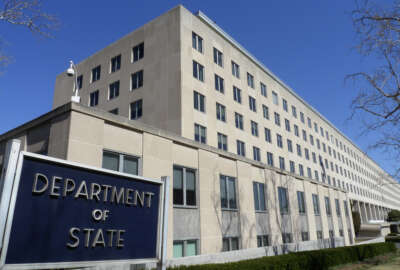

Hubbard Radio Washington DC, LLC. All rights reserved. This website is not intended for users located within the European Economic Area.
Employees at an office within the State Department’s human resources bureau frequently awarded family members, friends and acquaintances with paid positions o...
Employees at an office within the State Department’s human resources bureau frequently awarded family members, friends and acquaintances with paid positions on Foreign Service promotion boards, according to a watchdog report.
The State Department’s inspector general office, in a report released Thursday, found individuals closely connected to employees at the Bureau of Global Talent Management’s Office of Performance Evaluation (GTM/PE) served on Foreign Service Selection Boards every year from 2014 to 2021 — in some cases, multiple times.
Selection boards determine promotions for members of the Foreign Service under the 1980 Foreign Service Act. Current Foreign Service members and members of the public with expertise connected in some way to the mission of the Foreign Service sit on these boards.
The IG’s office began its work in 2020 following a whistleblower complaint. The report states several employees raised concerns that certain board selections amounted to “nepotism and favoritism.”
In one particularly “egregious” case, the IG office found the sister of a human resources specialist served as a public member on one selection board, despite her resume listing several years as a retail store cashier and no work experience relevant to the Foreign Service.
“According to a member of the Foreign Service that served on the board with the HR specialist’s sister, the sister did poorly, demonstrated a lack of comprehension, and would consistently miss the points of the board’s discussions,” the report states.
The HR specialist’s sister received $24,000 for her service on the board.
Public members brought onto selection boards include the father of one deputy office director, the brother-in-law of another deputy office director, as well as the wife and the sister of an Office of Performance Evaluation analyst.
Friends, former neighbors, and in one case, a parent whose child played sports with the office director’s child, also sat on selection boards.
The IG office found that the selection of friends and relatives of department staff was “inconsistent with department ethics rules,” as well as broader ethical standards for the federal workforce.
The IG report found that the bureau’s public member recruitment process lacked the necessary safeguards to “minimize the risk of favoritism and to ensure that the best-qualified applicants were recruited and chosen.”
Top members of the Senate Foreign Relations Committee said the Subcommittee on State Department and USAID Management, International Operations, and Bilateral International Development plans to hold a hearing soon on the IG report’s findings.
Subcommittee Chairman Ben Cardin (D-Md.) and Subcommittee Ranking Member Bill Hagerty (R-Tenn.) also urged Congress to pass legislation that would authorize a commission to reform and modernize the State Department.
“We are deeply concerned about the Inspector General’s report released today that says friends and relatives of State Department officials have been serving on panels that choose which diplomats are promoted,” the senators said in a statement Thursday. “This report raises questions of apparent violations of ethics, which undermine the credibility of the State Department.”
The committee approved a bill introduced by Hagerty in March that would set up a commission to modernize the State Department. The commission would look at ways to restructure the agency, as well as the state of the agency’s workforce.
That includes ways to improve recruitment, promotion, training and retention of agency employees.
The commission would include members appointed by House and Senate leadership, as well as the leadership of the House Foreign Affairs and Senate Foreign Relations Committees.
Carol Perez, the director-general of the Foreign Service and director of the Bureau of Global Talent Management, told the IG office that her office generally agreed with the report’s 13 recommendations.
The IG office reviewed the resumes of all 59 public members who served on selection boards between 2019 and 2021, and found that less than half of them fully met the qualifications to serve on the board, as outlined in the Foreign Affairs Manual.
“The resumes of the public members also frequently failed to demonstrate that they had gained prominence in a profession, in business, in labor, or in a non-governmental organization or institution serviced by, or having an interest in, the Foreign Service,” the report states.
The IG found that more than half of public members were selected through word-of-mouth efforts in recent years. However, the report also found that public members selected through a formal recruitment process were generally more qualified.
“Because these contract opportunities are not fully open to the public, even providing friends and family with the opportunity to apply can create appearances of favoritism,” the report states.
The IG office also found that the contracting personnel who helped bring these members onboard failed to provide the necessary oversight.
The Foreign Service convenes about 20 boards, each last for about four-to-eight weeks over the summer.
Foreign Service personnel and members of the public sit on each selection board, and review candidates for promotion. The Foreign Service Act directs the department to ensure “a substantial number” of women and minority groups are appointed to each board.
The department sends an all-hands cable to Foreign Service personnel seeking volunteers to serve on selection boards.
For public members, the department sends letters to universities, non-governmental organizations, affinity groups and other organizations seeking nominations. The department also recruits through word-of-mouth efforts. Former selection board members are encouraged to recruit new members.
The IG report describes the outreach for public members as a “semi-closed process,” and found that the department does not advertise board positions on its website or SAM.gov.
The department pays selection board members. Between 2019 and 2021, public members of selection boards were paid approximately $571 to $612 a day.
The IG found several examples of public members in 2019 and 2020 receiving approximately $20,000 and $30,000 in compensation.
The IG found that public members are paid for a full eight hours on days worked, regardless of whether they “work one or 100 hours” a day, according to what one division chief told auditors.
In one case, one public member was paid $571 a day for three days, despite putting in one hour of work each day.
Department officials told the IG office that its tailors its outreach to groups to get public members with specialized expertise. It may, for example, reach out to health care groups to find selection board members to review medical personnel in Foreign Service up for promotions.
The IG report, however, found no law enforcement groups listed in the department’s outreach database.
Meanwhile, the IG found that the division chief “almost exclusively” recruited public members with law enforcement backgrounds through word-of-mouth outreach to individuals who are current or retired members of a single police department in Maryland.
This outreach started in 2015, when an official at that police department served a public member, even though their child worked at the Office of Performance Evaluation.
“By failing to provide direct outreach to other law enforcement organizations concerning public member opportunities, GTM/PE’s current practice unfairly advantages law enforcement officers with connections to GTM,” the report states.
In addition to connected, but unqualified public members joining selection boards, the IG found cases where the department turned away qualified candidates from serving again on additional boards.
The IG office, in reviewing department emails, found that a fully qualified former public member sought to serve on another selection board, but the division chief declined the offer, and said the department was trying to “bring on new members every year.”
Two weeks later, the division chief recruited and selected two other former public members, who the IG determined were not fully qualified. One had personal connections to a bureau employee.
“Without adequate oversight of the recruitment and selection process, GTM/PE cannot ensure that the process is conducted in a manner that treats public member candidates equitably,” the report states.
Politico first reported on the IG report’s findings on Wednesday.
Copyright © 2024 Federal News Network. All rights reserved. This website is not intended for users located within the European Economic Area.
Jory Heckman is a reporter at Federal News Network covering U.S. Postal Service, IRS, big data and technology issues.
Follow @jheckmanWFED


